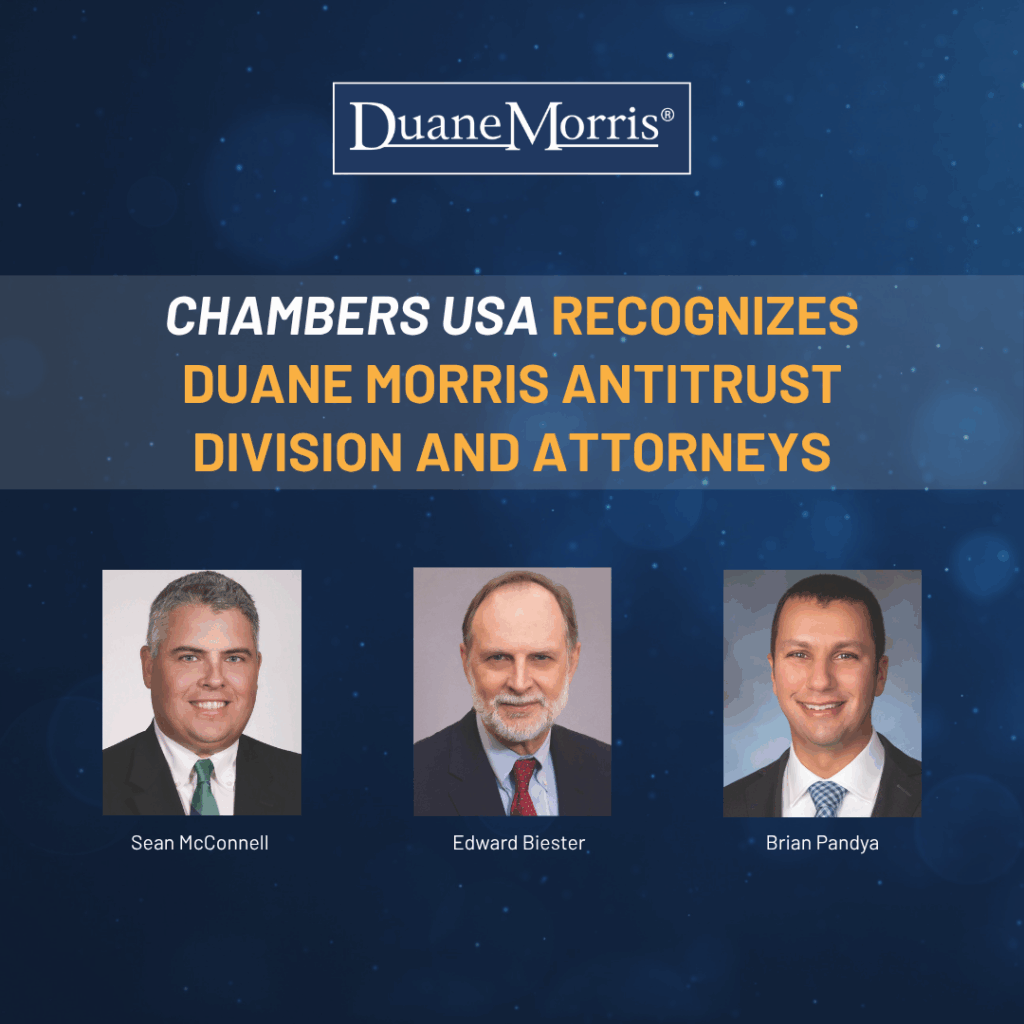The Federal Trade Commission (FTC) has formally abandoned its appeals in Ryan, LLC v. FTC (5th Cir.) and Properties of the Villages v. FTC (11th Cir.), effectively conceding the vacatur of its proposed nationwide ban on noncompete agreements. While this decision confirms that the FTC’s sweeping noncompete rule will not take effect, employers should not interpret the move as a retreat from scrutiny of post-employment restrictive covenants. On the contrary, recent enforcement actions and policy initiatives suggest that the FTC will continue to pursue noncompetes and similar labor market restrictive covenants through alternative strategies. Read the full Alert on the Duane Morris website.
Chambers USA Recognizes Duane Morris Antitrust Division and Attorneys
Duane Morris LLP is pleased to announced that Chambers USA has recognized Duane Morris Antitrust division and attorneys.

Pennsylvania
Edward G. Biester III, Antitrust
Sean P. McConnell, Antitrust
Washington, D.C.
Brian H. Pandya, Antitrust
Large No-Poach Class Settlement Gets Preliminary Approval in District of Connecticut
A putative class of aerospace workers recently obtained preliminary approval of large settlements with several government contracting firms in antitrust litigation in the U.S. District Court for the District of Connecticut. The nine named plaintiffs are current and former employees of Pratt & Whitney, which is now a division of RTX Corp. (formerly Raytheon Technologies Corporation). Pratt & Whitney manufactures jet engines for commercial and military aircraft. The other five defendants are suppliers of engineering services to Pratt & Whitney.
In their class action complaint, the plaintiffs alleged that the defendants conspired to restrict the recruitment and hiring of each other’s employees in violation of Section 1 of the Sherman Act, 15 U.S.C. § 1. Such agreements are commonly referred to as no-poach agreements. Specifically, the plaintiffs alleged that there were three types of illegal no-poach agreements: (1) an agreement between Pratt & Whitney and the engineering services firm defendants not to recruit or hire each other’s employees, which Pratt & Whitney primarily enforced; (2) an agreement that Pratt & Whitney would not hire from the engineering services firms without their prior written approval; and (3) additional bilateral agreements between certain firms and Pratt & Whitney limiting Pratt & Whitney’s ability to recruit and hire employees from that firm. Plaintiffs argued that this conspiracy restrained competition in the labor market for aerospace workers and suppressed employees’ compensation.
In order to obtain dismissal of the case with prejudice and an exchange of releases, Pratt & Whitney has agreed to pay $34 million into a settlement fund for the benefit of the class. Similarly, the engineering services firm defendants have agreed to pay $26.5 million into a similar fund. A hearing has been set for May 7, 2025 to determine final approval of the settlement after any objections or opt-outs from class members.
Federal Court Stops the FTC Noncompete Rule from Being Enforced or Taking Effect
On August 20, 2024, the United States District Court for the Northern District of Texas, in the Ryan lawsuit, struck down a final Federal Trade Commission (FTC) rule―which was set to go into effect on September 4, 2024, and ban noncompetition agreements for virtually all U.S. workers―holding that the rule shall not be enforced by the FTC or take effect as to any workers or employers. Read the full Alert on the Duane Morris website.
FTC Votes to Ban Non-Compete Agreements
On April 23, 2024, the Federal Trade Commission (FTC) voted 3-2 to approve a final rule banning non-competes with all workers 120 days after publication in the Federal Register, and invalidating existing non-competes with all workers except senior executives. Although the final rule abandons many aspects of the rule proposed in January 2023, the final rule represents a sea change in the law relating to non-compete clauses in the United States. Read the full Alert on the Duane Morris website.
FTC to Vote April 23 on Rule to Ban Noncompete Agreements
The Federal Trade Commission will vote at an open commission meeting to be held virtually on Tuesday, April 23, 2024, at 2:00 p.m. Eastern on its proposed rule banning employers from entering into noncompete agreements with workers. If issued, the final rule would go into effect 60 days following its publication in the Federal Register, and companies would have to be in compliance 180 days after publication. Read more on Duane Morris’ website.
SCOTUS Declines to Review Antitrust ATM Fee Dispute
On April 15, 2024, in Visa Inc., et al., v. National ATM Council, Inc., et al., No. 23-814 (Apr. 15, 2024), the U.S. Supreme Court declined a petition for review submitted by Visa Inc. (“Visa”) and Mastercard Inc. (“Mastercard”) urging the Supreme Court to resolve a circuit split over the correct standard of review courts should use when evaluating motions for class certification. Mastercard and Visa argued that the U.S. Court of Appeals for the D.C. Circuit erred by only requiring plaintiffs to show that questions common to the class predominate and allowing the fact finder to later address issues related to uninjured class members. The Supreme Court denied the petition for review.
The D.C. Circuit’s ruling in Visa v. National ATM Council is required reading for any corporate counsel handling antitrust class actions involving price-fixing allegations and underscores the importance of the standard of review used by courts when considering class certification. Read the full post on the Duane Morris Class Action Defense Blog.
Decertification Denied in Antitrust Home-Selling Commission Class Action
On March 26, 2024, Judge Stephen R. Bough of the U.S. District Court for the Western District of Missouri denied HomeServices of America’s (“HomeServices”) motion to decertify a class of home sellers alleging that that Defendants violated the Sherman Act by entering into a conspiracy to follow and enforce a rule adopted by the National Association of Realtors (“NAR”) that had the effect of raising commission rates in Moehrl et al. v. The National Association of Realtors et al., No. 1:19-CV-01610 (W.D. Mo. Mar. 26, 2024). HomeServices argued that the class of plaintiffs fail to satisfy Rule 23(b)(3) because trial showed that individual facts and proof predominated over common issues. The Court accepted Plaintiffs’ arguments that its expert sufficiently demonstrated a but-for world through common evidence, satisfying the predominance requirement of Rule 23(b). Moerhl is required reading for any corporate counsel handling antirust class actions involving price-fixing allegations.
Read more on the Duane Morris Class Action Defense Blog.
White House Announces New Strike Force on Unfair and Illegal Pricing
The federal government is taking a more aggressive approach to lowering prices and costs for American consumers. On March 5, 2024, President Joseph Biden announced a new Strike Force on Unfair and Illegal Pricing co-chaired by the Department of Justice (DOJ) and Federal Trade Commission (FTC). The strike force is yet another attempt by the federal government to implement the president’s July 2021 Executive Order on Promoting Competition in the American Economy.
NCAA Prohibited from Blocking NIL Compensation by Member Schools
A federal district court granted a preliminary injunction preventing the NCAA from enforcing one of its bedrock rules—that member institutions cannot directly compensate student athletes for name, image, and likeness (NIL). For over 100 years, NCAA bylaws prohibited payments to students representing member institutions in intercollegiate games to maintain amateurism across college sports. In recent years, due largely to mounting antitrust losses, the NCAA has allowed college athletes to earn compensation for their NIL but has prohibited compensation by schools and their boosters (so-called NIL collectives) related to the recruiting and transfer process. Believing that those prohibitions likely violate federal antitrust laws and harm students, the Tennessee federal court has preliminarily enjoined the NCAA from enforcing that restriction in State of Tennessee, et al. v. NCAA, No. 3:24-cv-00033.
Continue reading “NCAA Prohibited from Blocking NIL Compensation by Member Schools”
